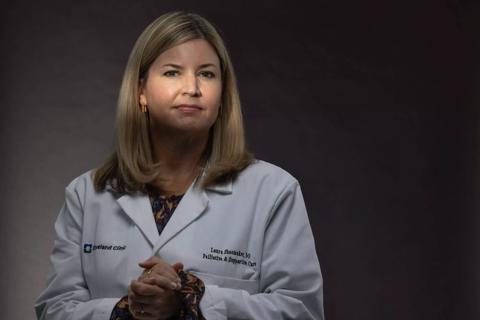Free tool helps improve policies and protect patients

Hospitals create conflict of interest (COI) policies to try to keep bias out of clinical care, research and educational activities. This bias, which is usually unconscious, may occur due to financial relationships that exist between doctors and researchers associated with for-profit companies. However, until recently, hospitals had no systematic way to assess COI policies—unless you count the negative feedback occasionally reported to their COI committees.
Advertisement
Cleveland Clinic is a non-profit academic medical center. Advertising on our site helps support our mission. We do not endorse non-Cleveland Clinic products or services. Policy
In April 2014, Cleveland Clinic, along with two other academic medical centers, began a 10-month pilot program to benchmark each organization’s knowledge and views of COI policies. The hospitals used a new survey developed and tested by a working group of COI experts, which included Susannah Rose, PhD, Scientific Director of Research at Cleveland Clinic’s Office of Patient Experience, as well as Cory Schmidt, JD, and Raed Dweik, MD, of Cleveland Clinic’s Innovation Management and Conflict of Interest Committee. The results of this program were recently published by PLOS One to help other medical centers benefit from this easy-to-use assessment tool.
By reducing bias, COI policies are helping protect patients from harm and increasing public trust in medical institutions. According to Dr. Rose, “A survey is the best way to get all people’s perspectives, including those who have for-profit industry relationships and those who do not.”
Evaluating these COI policies on a regular basis helps improve the quality of the policies, which, in turn, helps further protect patients, research participants and trainees from bias.
Cleveland Clinic has been one of the nation’s leaders in COI transparency efforts. In 2008, Cleveland Clinic became the first hospital in the country to publish the financial relationships of its physicians. According to Dr. Rose, “We strive to encourage innovation through relationships with industry. However, we are also open with the public to ensure that the quality of our research and clinical work is very high and free from bias.”
Advertisement
Furthermore, Cleveland Clinic recently adopted a new policy that requires physicians with significant financial relationships to disclose the information to their patients.
Respondents from three pilot sites appreciated the opportunity to provide feedback and reported wide satisfaction with their COI policies. However, there was little consensus on whether the hospitals’ COI policies are strong enough or whether they are overly burdensome. This lack of consensus indicates that clinicians and researchers impacted by these policies have varied opinions on their efficacy and adoption, allowing policy writers to refine policies or improve education related to policies already in place.
The survey includes questions about self-reported relationships with industry, which were used to measure changes in industry relationships and compliance, according to the PLOS One article. Also, “the in-depth analysis of perceptions of policies by those with and without ties shows the survey is able to distinguish significant differences between groups of faculty.”
This simple, flexible survey was designed to be used by any hospital administrator at any institution—without requiring data collection or analysis expertise. “Because the survey has already been developed, it provides a free, ready-made continuous quality improvement tool that demands little up-front costs to implement,” notes Dr. Rose.
It takes about 35 hours to deploy the survey, collect the responses and analyze the data. The survey uses the REDCap system, a simple software tool commonly used by most academic medical centers. The questions should take respondents no more than 10 minutes to complete.
Advertisement
Dr. Rose recommends the following steps for maximizing survey success:
To get started, access the generic “Conflict of Interest Policies Survey.”
Advertisement
Advertisement

In rehabilitation medicine, the answer might require nuance

Mental health colleagues can provide much-needed perspective

Palliative care specialists know hard conversations can also be valuable ones

Variables affect nuances of the conversation

Authors discuss ethical challenges associated with sponsored genetic testing

Program focuses on nurturing ethics leaders in daily practice

Medical, ethical and legal considerations

An end-of-life dilemma in the intensive care unit